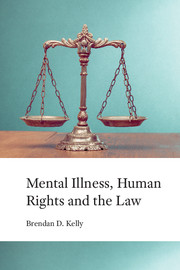Book contents
- Frontmatter
- Contents
- Foreword
- Preface
- Acknowledgements
- List of boxes
- List of legislation, treaties and conventions
- List of cases
- 1 Human rights and mental illness
- 2 Mental Health Acts 1983 and 2007: England and Wales
- 3 Fusing mental health and capacity legislation: Northern Ireland
- 4 Mental Health Act 2001: Ireland
- 5 The challenges of reform: Scotland
- 6 Structural violence, power and mental illness
- 7 Conclusions: fighting for rights
- Notes
- References
- Index
7 - Conclusions: fighting for rights
Published online by Cambridge University Press: 01 January 2018
- Frontmatter
- Contents
- Foreword
- Preface
- Acknowledgements
- List of boxes
- List of legislation, treaties and conventions
- List of cases
- 1 Human rights and mental illness
- 2 Mental Health Acts 1983 and 2007: England and Wales
- 3 Fusing mental health and capacity legislation: Northern Ireland
- 4 Mental Health Act 2001: Ireland
- 5 The challenges of reform: Scotland
- 6 Structural violence, power and mental illness
- 7 Conclusions: fighting for rights
- Notes
- References
- Index
Summary
This chapter draws together arguments, discussions and conclusions from preceding chapters and suggests ways to promote rights in clinical practice, with particular emphasis on achieving social justice for the mentally ill, their families and all who are affected by mental illness.
Arguments, themes, comparisons
Mental illness has long been associated with denial of human rights, especially denial of liberty and dignity. Although the 1700s and 1800s saw significantly increased emphasis on, and restatements of, key ideas about justice and human rights in general, the experiences of many individuals with mental illness during this period remained bleak, characterised by chronic neglect, social exclusion, and denial of agency and dignity in large, overcrowded institutions.
A detailed statement of rights specific to the mentally ill eventually appeared in the form of the United Nations’ (UN's) Principles for the Protection of Persons with Mental Illness and the Improvement of Mental Health Care (United Nations, 1991), but it is the European Convention on Human Rights (ECHR), which came into force in 1953, that has produced the greatest shift in thinking, with a series of judgments that strongly reemphasise various protections for the rights of individuals detained under mental health legislation, especially in relation to humane conditions in therapeutic settings and prompt, effective reviews.
The ECHR was given ‘further effect’ with its incorporation into national legislation in the UK (Human Rights Act 1998) and Ireland (European Convention on Human Rights Act 2003). As a result, it is now clear that there is a positive obligation on public bodies (at least in the UK and Ireland) to promote rights, and this appears to have particularly broad implications for mental health services, although this responsibility has yet to be fully delineated and operationalised satisfactorily.
In 2005, the World Health Organization (WHO) set out a ‘Checklist for Mental Health Legislation’, detailing human rights standards that need to be met in each jurisdiction (WHO, 2005). Concerningly, mental health legislation in England, Wales and Ireland fails to meet many of these standards, chiefly (but not exclusively) in areas relating to promoting rights, voluntary patients (especially non-protesting, incapacitous patients), protection of vulnerable groups and emergency treatment (Kelly, 2011). In both jurisdictions, however, mechanisms other than mental health law (e.g. policy) may meet some of the WHO requirements, although some of the requirements clearly remain challenging.
- Type
- Chapter
- Information
- Mental Illness, Human Rights and the Law , pp. 202 - 216Publisher: Royal College of PsychiatristsPrint publication year: 2016



